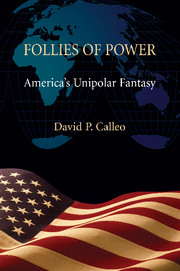Book contents
- Frontmatter
- Contents
- Acknowledgments
- Follies of Power
- PART I AMERICA'S GEOPOLITICAL ILLUSIONS AND THEIR CONSEQUENCES
- PART II THE NATURE AND LIMITS OF AMERICAN POWER
- 4 Assessing America's Soft and Hard Power
- 5 Feeding American Power: The Economic Base
- 6 Power and Legitimacy among Western States
- PART III WORLD ORDER IN THE NEW CENTURY
- Index
- References
4 - Assessing America's Soft and Hard Power
Published online by Cambridge University Press: 05 June 2012
- Frontmatter
- Contents
- Acknowledgments
- Follies of Power
- PART I AMERICA'S GEOPOLITICAL ILLUSIONS AND THEIR CONSEQUENCES
- PART II THE NATURE AND LIMITS OF AMERICAN POWER
- 4 Assessing America's Soft and Hard Power
- 5 Feeding American Power: The Economic Base
- 6 Power and Legitimacy among Western States
- PART III WORLD ORDER IN THE NEW CENTURY
- Index
- References
Summary
Soft Power – Exporting the American Way
A would-be hegemon should be well endowed with both hard and soft power; having one without the other can easily be self-defeating. Ambitious soft power, without hard power to guarantee respect, can make a nation seem pretentious and impotent. Hard power, without soft power to render it legitimate and welcome, is costly to sustain. How does this calculus apply to the United States?
The U.S. certainly has abundant soft power. Its high culture can scarcely be considered inferior to anyone else's – in the arts and sciences or in higher education and research – not least because the polyglot U.S. has historically been a refuge for persecuted talent from around the world. But America's accomplishments in high culture are rivaled by others and scarcely justify America's claims to a unipolar status. American popular culture, however, is so widely diffused that it can claim a unique global stature. Does its attractiveness to the world's masses translate into usable soft power? Arguably, foreigners often find most appealing those aspects of American popular culture most vociferously in opposition to America's own political, social, and military establishments. In any event, admiration for American popular culture does little to obstruct populist anti-Americanism. Terrorists eat at McDonald's, wear blue jeans, and download popular music.
What of America as a model for the world's political, social, and economic development? During various stages of the Cold War, as declinism regularly came in and out of fashion, many analysts feared the U.S. was somehow losing the battle of ideals to Marxism — Soviet, European, or Asian.
- Type
- Chapter
- Information
- Follies of PowerAmerica's Unipolar Fantasy, pp. 67 - 93Publisher: Cambridge University PressPrint publication year: 2009



